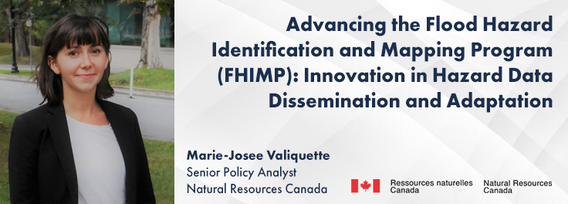Advancing The Flood Hazard Identification And Mapping Program (FHIMP): Innovation In Hazard Data Dissemination And Adaptation

My Session Status
Given that many Canadians are unaware of flood hazards, the FHIMP is working to fill gaps in knowledge for areas where data is either outdated or not complete. In this presentation, Natural Resources Canada (NRCan) will provide an update on the results of the first stage of the FHIMP (2021-23) and the FHIMP expansion (2023-2028).Over 200 projects are currently being implemented in over 300 locations across Canada, with activities ranging from data acquisition, flood hazard modelling, to the creation and dissemination of flood maps for the public.
The updated presentation will provide an overview of FHIMP’s comprehensive approach to flood hazard data, covering acquisition and mapping projects, open data dissemination platforms, and the policy implications and engagement required to convey this data in Canada – where jurisdictional authority for flood risk management largely lies with provinces and territories.
In addition, we will show how these data will inform cutting-edge geospatial innovation, including work on a new regional flood hazard models that leverage the Canada Centre for Mapping and Earth Observation’s (CCMEO) machine learning and AI expertise to create value-added geospatial products and analysis for all Canadians. We will share perspectives on lessons learned from FHIMP that involves complex data collection and dissemination of projects that can inform decision-making, land-use planning, and climate change adaptation.
